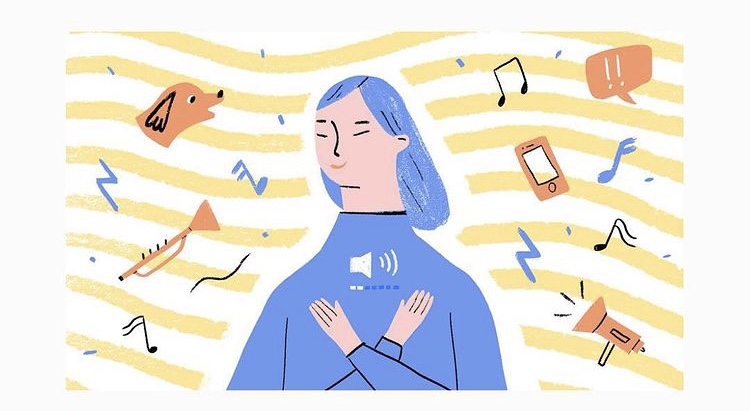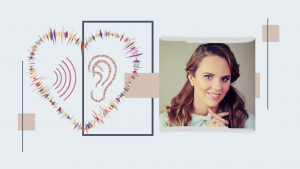| First published on Conteu’s website |
At Conteu, we believe that cross-disciplinary curiosity enhances our perspectives and pushes us beyond our comfort zone for the better. We asked Vicki Fourie, former Miss Deaf South Africa (2009), to share her personal story with us about the unique ways she experiences sound and and challenges the misconception that silence is a quiet space.
Hearing people generally believe that when you’re deaf, you live in a world of absolute silence. Almost every single hearing person I’ve met – upon learning that I can’t hear – tells me, “You are so lucky! You can simply switch off your hearing aids and drown out the noises around you.” To be honest, it is not that simple. Each one of us, hearing or non hearing, has an entire universe living inside of our minds; private lives and voices that are constantly speaking to us, whether consciously or subconsciously.
My dad – whose hearing was so perfect that it was annoying sometimes – went to Namibia a couple of years ago. When he arrived at the dunes, instead of hearing nothing like he expected to, he heard the unique sound of silence, a sound so loud that it was unbearable.
I grew up comfortable with the sound of silence – I do not see or perceive the world through my difference but I see the world in spite of it. I got my first hearing aids when I was two years old, which brought my hearing up to 40%. I also learnt how to speak like a hearing person, even though I have a slight ‘deaf accent’. I read lips, don’t speak sign language, went to a hearing school, have hearing friends, took drum lessons and dance classes and I excelled in drama. But as my mom says, I’ve had to work three times as hard in every single area of my life.
When it came to school, I had to work at concentrating on what was going on around me. I loved dancing and there was a period in my life where I didn’t wear hearing aids, but I couldn’t hear the music at all so I found a way. My ballet teacher would put the music on extra loud for me so that I could feel the rhythm of the music on the wooden floor. As for drama, I was able to feel the vibrations in my body when I spoke but I had no idea what I really sounded like. Sometimes I spoke too loudly, sometimes too softly.
I had my first cochlear implant operation in 2013 and my second one in 2015. In between these two it was a slow process to recovery and rehabilitation. I can now hear about 80% in both ears. However, there are times when I choose to take my hearing aids off; when I sleep (to be blissfully unaware of barking dogs, slamming doors, and ringing phones); when I shower (to think more clearly and allow my ideas to flow); and when I swim (to allow my body to be more mindful of the vibrations).
My eyes have been my ears all these years. Whenever I enter a room, I automatically scan the area. I ask myself these questions: ‘Is the room safe? Is there music playing in the background? Does the room echo?’ This helps determine how loudly I should speak. ‘How many people are there? Can I sit somewhere where I can see everyone’s faces altogether at the same time?’ This indicates how well I’ll be able to follow conversations as the more people there are, the more I have to concentrate on what’s going on. I have learnt to read people’s facial expressions and can pick up their mood quite quickly.
A friend of mine recently told me, “You’re a very focused person and you have the ability to drown out distractions around you. I think that’s a result of your deafness.” Most of her statement is true. I can be single-minded and passionate, especially when it comes to cultivating my inside world. But her attributing that to my deafness might not be entirely accurate. My mom is also a focused person, but she doesn’t have any hearing problems. What if the way I am is not because of my hearing but because of certain character traits that I inherited from my parents? At times certain people look at me and can’t see past my disability. I’ve met a handful of people like that in my life and it says a lot about them and their limited perceptions of people and the world around them. What people think or say of me doesn’t define who I am. I don’t see myself as a disabled person. In fact, I often feel that my disability has enabled me to do everything and anything that I’ve wanted to do in this life. I know who I am and I know where I’m going.
Our own experiences, emotions, memories and circumstances surrounding us make us into who we are. However, the way we look at our own lives and ourselves determines what will come of it. Each one of us form our own creative worlds inside of us, in a place that is deeply profound and cannot really be explained. We need to ask ourselves this: can we quieten ourselves enough to listen to that sound of silence that is being formed and created in our very beings? And can we be brave enough to let those creative juices flow outwards?
Vicki Fourie keeps track of her ideas by journalling pictures, thoughts and ideas. She also regularly visits seminars, conferences and trainings with others who share the same interests as her to stimulate her creativity. Her memoir – Viva la Vicki – was published in 2012, and her second book, a devotional (God Lief My), was published in 2014. She is a motivational speaker and currently resides in Johannesburg.
INSTAGRAM: @fourievicki
WEBSITE: www.vickifourie.com

